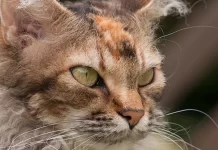Last Updated on August 12, 2023 by Fumipets
British Longhair Cats: Elegance and Charm in a Luxurious Coat
The article “British Longhair Cats: Elegance and Charm in a Luxurious Coat” delves into the captivating world of British Longhair cats, highlighting their distinctive features and the unique charm they bring to the feline realm.
The article emphasizes their most prominent trait – their luxurious, flowing coat – that sets them apart in the feline world. With a focus on their elegant appearance and gentle temperament, the article portrays British Longhair cats as ideal companions, particularly suitable for families with children due to their patient and affectionate nature.
Grooming guidance is provided to help readers care for the stunning coat of these cats, and their health considerations, such as dental care and weight management, are also discussed.
In addition, the article addresses their compatibility with other pets and highlights their sociable nature. Overall, the article paints a portrait of British Longhair cats as graceful, charming, and adaptable feline companions, adding a touch of elegance to any household.
British Longhair Cats
The British longhair cat has a loving disposition and a bear-like face. These cuddly cats, a mix of the Persian and British shorthair breeds, are native to Britain. Although it has theoretically existed for generations, the British longhair has just lately been recognized as a distinct breed.
These sweet kitties are devoted, obedient, and undemanding. The British longhair cat is a wonderful option if you’re seeking a family cat or loyal friend to keep you company without being too dependent.
Depending on pedigree, British longhair kittens from a reputable breeder generally cost between $800 and $1,200.
Appearance
British longhair cats have lovely, round faces, long hair, and medium stature. This breed has an endearing appeal because of its big wide eyes, endearing facial expressions, and silky coats. These cats have strong bodies underneath all of their fur. Male British longhairs often weigh more than females, between 8 and 16 pounds on average.
The thick, straight coats of British longhair cats stand off from the body to give the impression that they are bigger than they really are. Additionally, they have velvety, thick coats that come in a variety of hues, such as black, lilac, chocolate, or golden.
They may also be bi-colored, ticked, or color-pointed. Compared to other longhaired breeds, British longhair cats sweat less, although they do have a dense undercoat.
With the exception of their long, velvety coat, British longhairs adhere to the same breed standard as British shorthairs, which is why they are sometimes likened to Persian and British shorthair cats in appearance. The Persian cat branch of the British longhair’s ancestry is responsible for its stunning mane.
Temperament
These adorable kitties are just as nice as their cheery smiles would suggest. British longhair cats are renowned for their accommodating nature and pleasant, tranquil disposition. These cats are not readily agitated—some may even describe them as being sluggish!
Even though they sometimes act like lively kittens, they are substantially less energetic than other cat breeds, and their activity level decreases as they mature. In addition, they sleep a lot, especially for cats.
But these devoted kitties are much more than simply buddies for couch potatoes. They are very gregarious, loving, and intellectual. The British longhair is a devoted breed that enjoys spending time with humans and is adaptable to most settings.
These cats are quite gregarious, yet they also have a strong sense of independence and often feel comfortable going it alone. These cats aren’t always going to leave you alone; in fact, some people have called them small “private investigators”.
These cats are highly inquisitive, much like the cats from popular culture. Be prepared to encounter these cats rummaging through your belongings or lurking close to observe what you’re doing.
Although British longhair cats are friendly and accepting of kids, they greatly dislike being picked up. Parents will need to spend time instructing young children to meet these cute kitties on the floor for caressing and playing rather than picking them up.

Living Needs
The British longhair is adaptable to a range of living situations because of its relaxed nature. They make tolerant, caring companions for families with small children and many visitors because of their soft, laid-back dispositions. These affectionate cats are gregarious and versatile, and they don’t mind loud dinner parties or inquisitive kids.
They are not at all needy, and they are okay to be left alone when you go to work or social engagements. Because of their independence, British longhairs may sometimes be a little stubborn. When owners try to get them to play when they’d rather lay about, they often won’t react. They want to do things on their terms.
This does not, however, imply that your British longhair cat doesn’t want to interact with you. Instead, you will need to carve out time to express your love and admiration for them. They won’t feel lonely if they receive plenty of hugs, praise, and company from other animals.
These cats like chit-chatting and will regularly engage in short exchanges with you to let you know they’re thirsty, hungry, or simply trying to gain your attention. This breed may not be the ideal choice if you have easily annoyed roommates or live in an apartment with thin walls.
The British longhair is an excellent choice if you’re seeking a gentle, affectionate pet that can adapt to a variety of lifestyles and living situations. As long as they get lots of love and care, this relaxed cat is ideally suited to family life, frequent travel, and most other living circumstances.
Care
Because of their distinctive long hair, this breed may be difficult to groom. They must be softly and in tiny portions brushed with a bristle brush a few times each week. Since the British longhair typically takes care of himself, bathing requirements are rare.
Your British longhair cat is prone to eating a lot of hair and having hairballs as a result of all of this self-grooming. Brushing your cat more regularly or giving him hairball remedies may also help.
Owners must encourage British longhair cats to walk about since they have a tendency to be a little bit lethargic. Encourage play often and give climbing cat trees and interactive cat toys.
According to Natalie L. Marks, DVM, CVJ, and Royal Canin veterinary partner, “Weight management is very important with these cats because they tend to be less active as adults as compared to other cat breeds.” They are prone to obesity, thus regular exercise is essential.
These cats are usually straightforward to educate to do basic chores like utilizing a litter box or a scratching post since they are clever. These food-loving cats will always enjoy a treat as a kind of positive reinforcement, and with the correct incentive, they may even pick some amusing tricks.
With this easygoing breed, socialization should be straightforward. British longhair kittens that are socialized with humans and other animals at a young age are often friendly and accepting of strangers.
The British longhair should be given a diet of premium cat food that has been authorized by your veterinarian. Look for substances that mostly include proteins from animals. You may feed your British longhair either dry or wet food. It’s crucial to keep an eye on your dog’s food consumption since this breed is prone to obesity.

Health
Although they are not more prone to sickness than other cats, British longhair cats can sometimes have health problems. The expected lifetime for this breed is 15–17 years.
In polycystic kidney disease, cysts form on the kidneys and cause diminished function and finally failure, according to Marks. The risk of this illness in the parents may now be determined via DNA testing, and this should be examined beforehand. The Persian ancestors of the British longhair are likewise particularly susceptible to this illness.
Responsible breeders will screen their kittens for hereditary conditions, but it’s crucial to attend your cat’s routine checkups and follow your veterinarian’s recommendations. Later in age, health problems might arise and need to be watched for.
History
According to The International Cat Association (TICA), British shorthair and Persian cats were crossed to create the British longhair, which was first developed in Britain in the early 20th century. Long-haired Persian cats have been bred with British shorthair cats, but the offspring were uncommon since they had the Persian long-haired gene.
The breed just recently attained breed classification since they were only selectively selected for their unique characteristics. The relationship between the British longhair and its namesake and predecessor, the British shorthair, is a major theme in the history of the breed.
Frequently Asked Questions
What distinguishes British Longhair cats from other breeds?
British Longhair cats share many traits with their shorthair counterparts, but their most distinct feature is their luxurious, flowing coat. This sets them apart as a breed known for their elegant appearance and gentle demeanor.
Are British Longhair cats good for families with children?
Yes, British Longhair cats are known for their gentle and patient nature, making them a great choice for families with children. They often tolerate handling and playtime, forming strong bonds with both children and adults.
How do you care for the coat of a British Longhair cat?
British Longhair cats have a dense, long coat that requires regular grooming to prevent matting and keep it in top condition. Regular brushing, especially during shedding seasons, is essential to maintain the coat’s beauty and health.
Do British Longhair cats have specific health considerations?
Like all breeds, British Longhair cats can have specific health concerns, including dental issues and obesity. Regular veterinary check-ups, a balanced diet, and engaging in regular play to keep them active are important to ensure their well-being.
How do British Longhair cats interact with other pets in a household?
British Longhair cats are generally sociable and can get along well with other pets, including dogs and other cats. Proper introductions and supervised interactions during the initial stages are important to ensure a harmonious relationship among all pets.


















